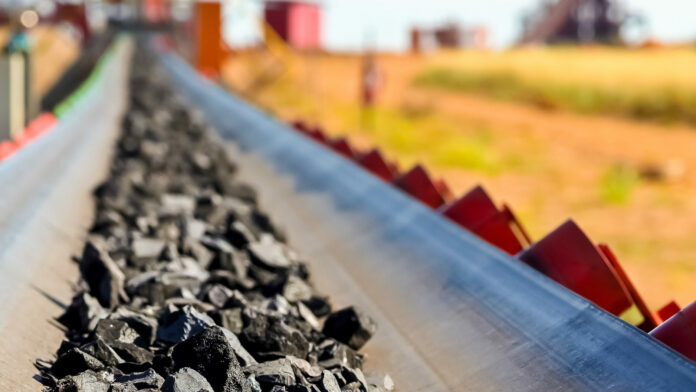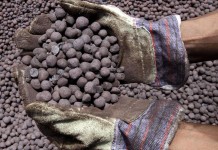
AFTER casting its line far and wide for three years to diversify from thermal coal production, Exxaro Resources now has its foot in the door in the Northern Cape’s manganese fields. About 70%-80% of the world’s total unmined manganese, a mineral primarily used in steel production, occurs there — enough to last at least 80 years.
Exxaro is buying 100% of Ntsimbintle Mining, a company controlled by veteran investor Saki Macozoma. The centrepiece asset is the profitable Tshipi Borwa mine, which produces 3.2 million ton (Mt) to 3.4Mt a year of manganese. Including Ntsimbintle’s 19.9% stake in Jupiter Mines, an Australian firm, Exxaro comes out with 60.1% of Tshipi Borwa.
Tshipi Borwa is quite the mine. It has yielded unbroken annual dividends since 2017 even though prices for manganese have been weakening for the last four of those years, from $5.72 per dry metric ton on average to $3.28/t. Costs for the six months ended March averaged $2.36/t, according to Jupiter Mines’ interim statement.
For this, Exxaro is paying an unadjusted R11.7bn, equal to eight times Tshipi Borwa’s earnings before interest, tax, depreciation and amortisation.
Ben Magara, Exxaro CEO since April, said his company has made a good offer because manganese is at a cyclical low. In addition the offer implies no meaningful future appreciation in the manganese price — though Exxaro has assumed $4.20/t, which is slightly above spot.
The offer is also for control of marketing rights over Tshipi Borwa’s output and its established supply chain. Only about 0.7Mt of Tshipi Borwa’s manganese ore is trucked to port; the balance is tied to more cost-effective rail freight agreements in South Africa and Namibia.
The offer also includes Ntsimbintle’s shareholdings in Mokala, a new manganese mine in which Glencore has tag-along rights; these, if exercised, will increase the overall purchase price to R14.6bn. The acquisition cost could fall to R9bn if Glencore retains its stake and Anglo American and South32 exercise their pre-emptive rights over Ntsimbintle’s 9% stake in Hotazel Manganese Mines, operator of the Mamatwan and Wessels mines that produce between 2Mt and 3.5Mt a year.
Either way, Exxaro can fund the deal without breaking sweat. Cash on hand, including facilities, stood at R15bn as of December 31. Exxaro FD Riaan Koppeschaar said the dividend policy will be unaffected. A share buyback programme, announced by Exxaro in March, is also intact.
So far so good. It’s worth remembering, however, that Exxaro’s strategy is to “consolidate” the manganese fields. Commenting in March on the firm’s diversification plans, Exxaro’s head of new business, Richard Lilleike, said the strategy was “a case of unlocking that first deal which we feel could be a catalyst to something bigger”.
Magara played down what that could be. “Right now, we are focusing on bedding down the assets,” he said in an interview. In any event, the transaction is only due to close next year. Macozoma warned not to “count our eggs” though no serious hurdles are expected as Glencore and Hotazel Manganese shareholders were consulted in the process. The first note of congratulations came from Jupiter Mines chair Ian Murray, said Macozoma.
Tough to consolidate
The fractured nature of South African manganese production needs a consolidator. There are nine different manganese miners supplying 30% of global production. Housing some of that under a single owner opens the door to logistical synergies and joined-up decisions on supply and capital allocation.
Consolidation of the region is a tough nut to crack, however. Macozoma said that in a previous attempt to bring the parties in the sector together, his Safika Holdings sought to list Ntsimbintle in an effort to establish a market price for the assets and a basis for dealmaking. But these efforts were frustrated by Jupiter Mines — then under the management of Brian Gilbertson.
Following a management coup that removed Gilbertson, talks resumed with Jupiter. “We agreed with Jupiter on almost every point,” said Macozoma. “But the issues of the domicile of the company and the tax burden that would be crystallised were the dealbreakers in that process.”
Asked if Exxaro had first sought to buy Jupiter Mines at a lower premium instead of buying 100% of the mine, Lilleike told an analyst this month that this was an aspect “we discussed with advisers ad nauseam”, hinting at the complexity. In the end, Exxaro opted to deal with an empowered company that also provided access to a portfolio of assets.
Jupiter declined to respond on its positioning, but seeking a consolidation with Anglo American and South32 at Hotazel will be just as tricky. While neither party could be considered unmovable owners in South African manganese, the assets remain strategic.
Anglo CEO Duncan Wanblad, in an interview with Miningmx this year, said of the firm’s stake in Hotazel Manganese: “There is no need to do anything at this point. It’s a relatively small part [of the company] and provides a set of opportunities I’m not prepared to eliminate.”
A version of this article first appeared in the Financial Mail.









